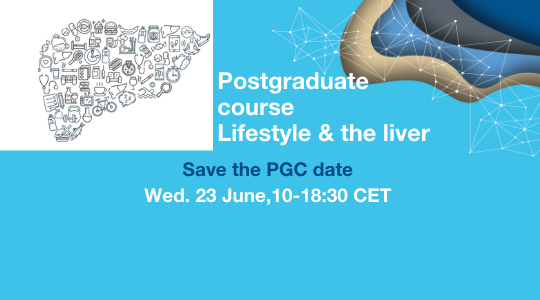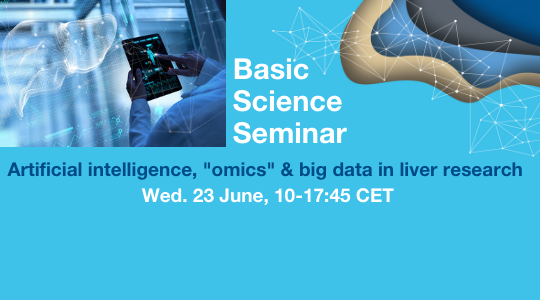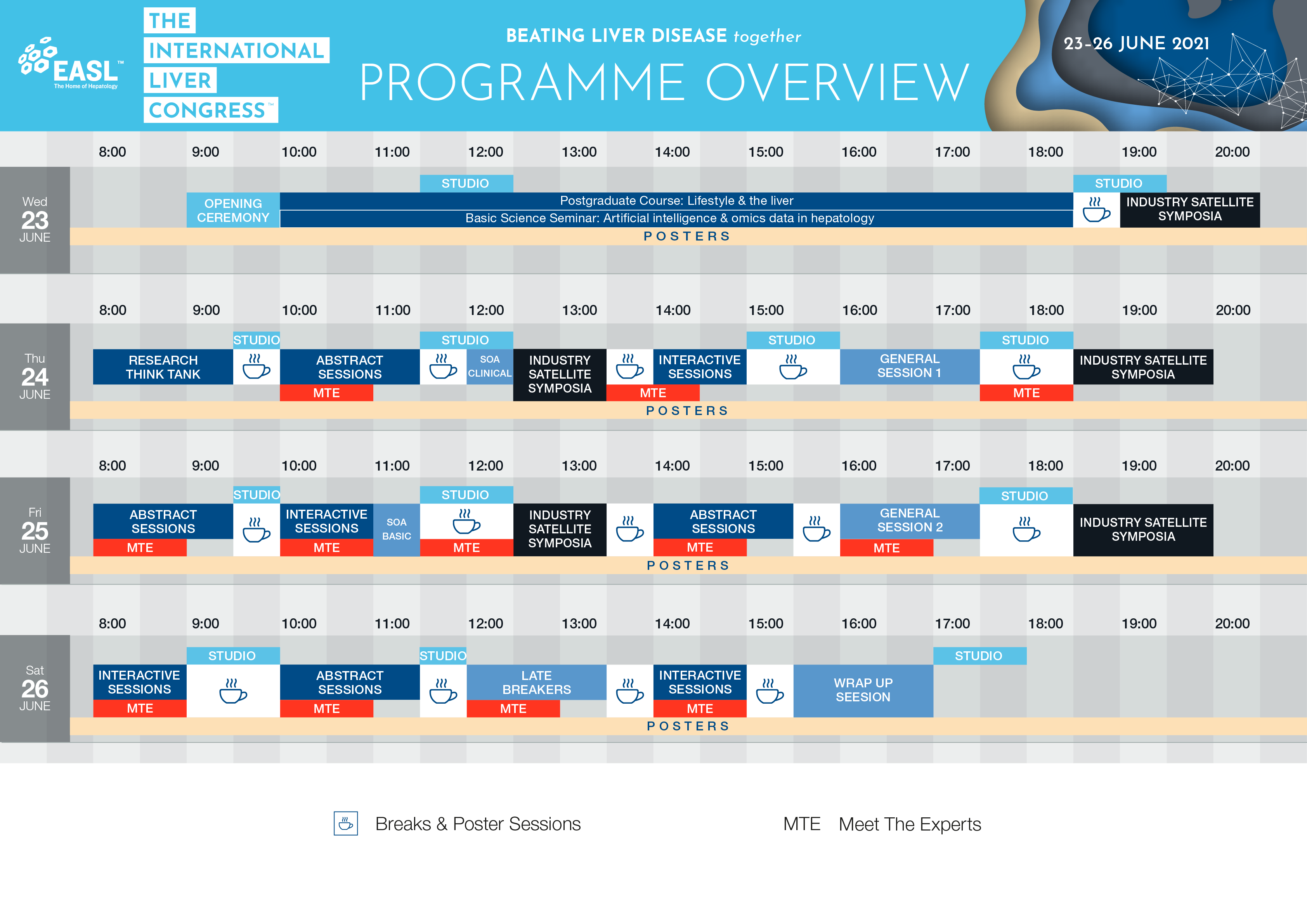A multidisciplinary approach to beating liver disease
In 2021, we will be bringing the members of our community together again to explore how to tackle liver disease using a multidisciplinary approach. Delegates will hear the latest in epidemiological and real-world data on liver disease and gain a deeper understanding of the underlying mechanisms. Leading clinicians and researchers in the field will talk about their daily interactions with patients to help or even reverse liver disease, and about updates on treatment options.
Registration to the ILC 2021 will not guarantee access to the Meet the Expert sessions.
100 seats are available on a first come, first served basis. No on-demand will be made available.
Those sessions are not recorded to encourage interaction.
ILC 2021 - Flagship sessions
The official hour of the entire International Liver CongressTM 2021 is CEST (Central European Summer Time).
Features of each track
Click on each box to discover the content of the given track.
We are very excited that from ILC 2021 onwards, there will be a complete Basic Science track, covering updates on basic liver biology, such as development, circadian rhythm, organ-on-chip in-vitro models, and liver tissue engineering. This track runs alongside basic science seminars on the mechanisms of liver disease and treatment targets. Meetings and sessions are organised to facilitate interaction among clinical and basic scientists.
In addition, as is the tradition of our flagship congress, ILC 2021 will cover the latest updates on basic liver disease mechanisms and treatment targets for different liver diseases. Learn about their influence on the field of hepatology in two Meet-the-Expert sessions.
Key topics addressed
- Updates on basic liver biology: development, circadian rhythm, organ-on-chip in-vitro models, and tissue engineering
- Updates on basic liver disease mechanisms and treatment targets
- A special focus on two of the 2020 Nobel Prizes: hepatitis and CRISPR/Cas9
At ILC 2021, this track presents an overview of the role of vessels in liver diseases. The track content will include not only the role of liver sinusoidal changes in liver disease progression, but also the management of portal and hepatic vein thrombosis and their complications. The management of complications of portal hypertension will also be addressed, including the place of transjugular intrahepatic portosystemic shunt (TIPS) and the management of patients with advanced cirrhosis and acute-on-chronic liver failure (ACLF).
Recent advances on challenging situations such as portopulmonary hypertension, as well as abdominal surgery in patients with portal hypertension, will also be addressed.
Key topics addressed
- Changes in liver vessels as drivers of liver disease progression
- Management of complications of portal hypertension
- Management of acute decompensation of cirrhosis and its transition to organ failure
- New challenges in the management of vascular liver diseases
We are pleased to present a very exciting programme for the General Hepatology track of ILC 2021. The basic science postgraduate content is devoted to the use of artificial intelligence and omics data in the field of liver disease. A dedicated day focusing on hot topics in liver transplantation is co-organised with ELITA, ILTS, and LICAGE. Our symposia focus on the use of statistics in hepatology, the prospect of genomic editing for treating liver diseases and also the entity of porto-sinusoidal vascular liver disease. Our Meet-the-expert sessions cover Wilsons disease, liver disease in patients with Fontan surgery, and organ allocation beyond the MELD score. Last but not least, the Young Investigators sessions focus on lessons learned from the COVID-19 pandemic and translational research in hepatology.
Key topics addressed
- Artificial intelligence in hepatology
- Developments in liver transplantation
- Epigenetic/etagenomic alterations in liver disease
- Genomic editing in the treatment of liver disease
The field of immune-mediated and cholestatic liver diseases remains one of the most intriguing in hepatology, considering the increase in understanding of the molecular pathophysiology and – in parallel – the fast development of promising new therapies.
The Research Think Tank on autoimmune hepatitis (AIH), primary biliary cholangitis (PBC), and primary sclerosing cholangitis (PSC) will focus on newest pathophysiologic insights, diagnostic, and therapeutic approaches in these immune-mediated and cholestatic diseases.
A separate symposium on the most recent findings contributing to a better understanding of the pathogenesis of PSC will address genetic, environmental, and endogenous factors leading to the development of PSC.
The impact of COVID-19 for patients with immune-mediated liver diseases and the potential risks of immunosuppressive and immuneomodulating therapies in AIH, other systemic diseases and after liver transplantation will be addressed in a symposium dedicated to immunosuppression and COVID-19.
Hepatobiliary manifestations of IgG4-related disease have come to the community’s attention only in the last 10-15 years. They have probably been overlooked or misclassified for decades since their putatively first clinical description more than 150 years ago. A symposium will focus on this – so far – poorly understood disorder.
Recurrent bacterial cholangitis and sclerosing cholangitis of the critically ill patient (SC-CIP) are relevant clinical entities with a dismal prognosis. So far, they have not secured the attention of researchers needed. Meet-the-Expert sessions will cover these diseases, as well as the treatment of patients with AIH and PBC in 2021.
Key topics addressed
- Newest pathophysiologic insights, diagnostic, and therapeutic approaches in immune-mediated and cholestatic diseases
- Pathogenesis of PSC
- Impact of COVID-19 for patients with immune-mediated liver diseases
- Hepatobiliary manifestations of IgG4-related disease
The programme for the Liver Tumours track takes into consideration basic and translational science, public health, and clinical practice issues. This part of the programme aims to cover a wide spectrum of, to date, unmet topics or areas of knowledge. For these topics, expert discussion could be of interest to the full scientific community.
The programme includes sessions for basic researchers, such as metabolism and cancer. While other sessions focus on topics, such as how the pathology information could help clinicians in their clinical decision-making or issues related to the follow-up of the patients after receiving hepatitis treatment, which could impact on public health decisions. Finally, further sessions focus on novel treatments, such as loco-regional treatment, as well as immunotherapy in liver cancer.
Key topics addressed
- Adenomas
- Rare Tumours, cholangiocarcinoma
- Immunotherapy
- Clinical decision-making
- Metabolism and cancer
Increased fat in the liver (fatty liver) is the leading cause of liver disease, and prevalence is on the rise, posing a threat to public health. Risk factors include excess calories and alcohol, low physical activity, and being overweight, but alterations in the gut–liver axis and inherited factors also play a role. Indeed, non-alcoholic steatohepatitis (NASH) and acute alcoholic hepatitis remain the main drivers of liver disease worldwide.
Urgent unmet needs include: development of optimal approaches to improve lifestyle and prevent disease development and progression, strategies to identify at-risk individuals in the population, accurate non-invasive biomarkers of liver damage, and pharmacological treatments to contrast disease progression.
On the other hand, technological advancements in human and molecular genetics are leading to improvements in the diagnosis and treatment of genetic disorders of liver metabolism.
Key topics addressed
- Update on the optimal therapeutic management for patients with non-alcoholic and alcoholic fatty liver disease (NAFLD), including the role of changes in lifestyle and the multidisciplinary management of patients with metabolic dysfunction, hepatocellular carcinoma surveillance and the latest results from NAFLD trials
- New insights into fatty liver disease pathogenesis and emerging therapeutic targets from genetics and basic studies
- Update on the clinical management of rare metabolic liver disorders
Although hepatitis viruses share a target organ, the liver, their pathophysiology, and clinical outcomes can differ greatly. Indeed, from asymptomatic, self-limiting infection over fulminant hepatitis with acute liver failure to chronic infection with progressive fibrosis and development of cirrhosis, hepatitis virus infections can cause a broad range of disease courses.
Within these many possible outcomes, several aspects require close attention to provide optimal care for affected patients and to reach the goal of eliminating viral hepatitis as a relevant cause of morbidity and mortality worldwide. Some of these challenges will be addressed at ILC 2021, including the optimisation of providing diagnosis and care to marginalised populations with viral hepatitis and identifying remaining challenges in the treatment of chronic HCV, as well novel biomarkers with the potential to improve treatment protocols for chronic HBV.
In addition, potential benefits and the risk of viral flares and reactivation in patients receiving checkpoint-blockade or immunosuppressive drugs will be discussed.
Key topics addressed
- Established and emerging biomarkers to predict clinical outcomes and provide guidance for treatment decisions in HBV infection
- Remaining medical and public health challenges in hepatitis C treatment
- Influence of immunomodulatory drugs on the clinical course of viral hepatitis
- Challenging courses of HEV infection
Create your customised programme browsing the numerous options available
- General sessions and late-breakers
- Young Investigators sessions
- Research Think Tanks
- Wrap-up sessions
- Awards ceremony
- Industry Satellite Symposia
Clearly defined tracks in:
-
- Fundamental basic science
- Basic science seminar
- Abstract presentation preceded by a 30-min topic overview
- State-of-the-Art lecture
- Meet the Experts
- Interactive symposia
- Poster tours
- Liver transplant
- Liver transplant course
- Abstract sessions
- Meet the experts
- Symposia
- Fundamental basic science
- Nurses and allied health professionals
- Oral abstract and poster sessions
- Meet the Experts
- State-of-the-Art lecture
- Interactive sessions (symposia and case studies)
- Public health
- Joint sessions with international health organisations
- Liver disease and the community session
- Abstract sessions
- Usual track-based clinical sessions
- Oral abstract and poster sessions
- State-of-the-Art lecture
- Meet the Experts
- Interactive symposia
- Postgraduate course
Don’t miss these compelling components of our flagship event:
State-of-the-Art lectures
- Immunotherapy in HCC
- Immunometabolism for hepatologists?
- Lifestyle and Public Health




